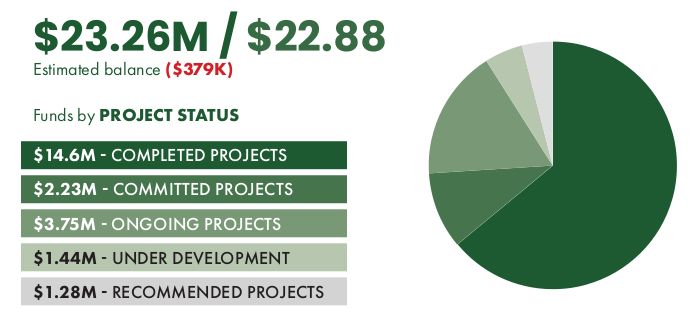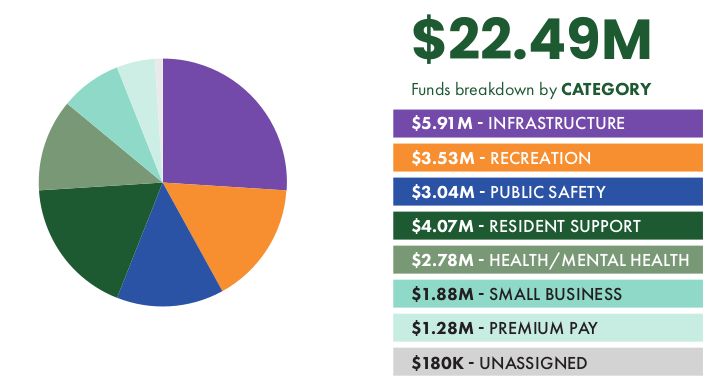On Monday, October 7, the Greenbelt City Council met with staff in a worksession to discuss the status of the American Rescue Plan Act (ARPA) federal funds that have been allocated to the city.
Good Problems
City Manager Josué Salmerón summarized the situation as the city having “three good problems.”
The city has received more ARPA funding than almost any other municipality in Maryland – second only to Baltimore. That such a high amount of federal funds was given to a city the size of Greenbelt is significant. As a result, Salmerón anticipates the city will be audited to verify that all ARPA funds were used properly. While he is confident that the city can weather the scrutiny, city staff are preparing for any additional reports prior to the federal government’s deadline at the end of December by building in an internal deadline of November 30 so they have adequate time to respond.
The second good problem is that the city still has over $1 million in ARPA funds to obligate before the end of the year. The majority of that windfall is due to developments in the Aquatic Center’s indoor pool repair plans; the city initially set aside about $800K in ARPA funds to the project, but thanks to the city’s use of the Project Open Space program earlier this year, the city was able to free up those ARPA funds.
Thankfully, the city has multiple potential projects which could use the remaining ARPA funds. However, according to Salmerón, that’s also the city’s third good problem: the cost of all potential projects that could use ARPA funds is greater than the remaining funds, which requires council to be selective. City staff prepared a list of potential projects for council to discuss, and the list will grow as more potential projects are found. For example, just two hours prior to the start of the worksession, the Municipal Building’s elevator broke down; repairing that elevator could be done through ARPA funding under the Infrastructure category.
Priorities, Considerations
Council discussed priorities that they had for obligating the remaining ARPA funds. Mayor Emmett Jordan recalled how in the early years of the Covid-19 pandemic, many capital expenditures were paused, and how using ARPA funds has allowed the city to make up for lost time due to those delays in repairs and replacements. Councilmember Silke Pope was clear that the programs which promoted safety were her priority, though Salmerón clarified that while only a handful of the listed potential projects were categorized Public Safety, most of the listed programs would benefit safety. For example, although a new animal control facility is an Infrastructure project, its construction would make the working environment safer for the staff, and animal control relates directly to public safety.
There were only a few projects on the table that council didn’t want to move forward. One was the creation of a dog park water station, which is projected to cost $120K; the hefty price caused sticker shock among councilmembers, who were confident that a cheaper alternative to laying down new pipes could be found. Councilmember Amy Knesel also believed that using ARPA funds to cover the salary of the city staff who administered the funds is a low priority, arguing for the use of city funds for the water station.
Even without those two line items, the total cost of the other potential projects was still in excess of the remaining ARPA funds, so council then discussed frameworks for evaluating the projects.
Though every listed project could use ARPA funds, many could also be funded through alternative means. The city could use tax revenue, apply for grants or use bonds to cover projects. Though it requires a bit of coordination, it’s also possible for the city to share costs with other municipalities for projects that would benefit multiple jurisdictions. Factoring in which projects will have difficulty getting funding through other means may help determine which ones will use the ARPA funds.

The timeliness of projects was also considered. Funding some projects may have an immediate effect, such as purchasing a new Community Emergency Response Team trailer to replace the broken one. Other projects could have their funding broken out into phases, with early phases covered by ARPA funds and later phases covered by an alternative funding source. As the deadline to spend ARPA funds is June 2026, some projects would already need to be phased this way if they were continued past that deadline, such as the city’s food pantry donations.
Because the number of potential projects and their costs is in flux, Councilmember Kristen Weaver suggested that councilmembers order the projects through a ranked choice listing so that they could adapt their decision making as the details continue to develop.
Reparations Commission
The line item that garnered the lengthiest discussion among council and residents was the funding request from the Reparations Commission. Lois Rosado, Commission chair, along with members Bob Rand and Tom Adams, addressed how the cost for the Commission’s Phase II was calculated and how important that funding is.
Of the $165,000 requested, $120,000 would go to paying for expert support, $30,000 for administrative work and $15,000 for outreach. Rosado used the Reparations Commission of Providence, R.I., as a reference point as their work is similarly bifurcated – considering reparations through the lens of the impact on local First Nations as well as the Black community. Providence was also a helpful reference point as it has used ARPA funds to support its commission.
Though the Reparations Commission will provide its full recommendations to council after Phase II, an early takeaway that commission members shared is the realization that there is potential for harm if commission recommendations are inadequately implemented. Rosado hopes that sufficient funding will allow the commission to adequately meet its mandate. This sentiment was echoed by Councilmember Danielle McKinney, who said that because the commission was created by the city council, council had a duty to make sure it is set up to succeed.

